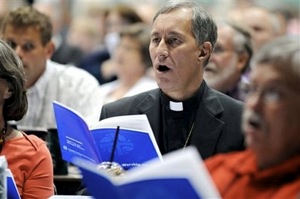national
Lutheran gay clergy vote tests mainline churches
Votes to allow gays and lesbians in committed relationships to serve as clergy
Published Thursday, 27-Aug-2009 in issue 1131
DENVER (AP) – In breaking down barriers restricting gays and lesbians from the pulpit, the largest U.S. Lutheran denomination has laid down a new marker in a debate over the direction of mainline Protestant Christianity, a tradition that once dominated American religious life.
By voting Aug. 21 to allow gays and lesbians in committed relationships to serve as clergy, the 4.7-million member Evangelical Lutheran Church in America will either show how a church can stand together amid differences, or become another casualty of division over sexual morality and the Bible, observers say.
“We’re going to be living in tension and ambiguity for a longer time, partly because the culture has shifted,” said David Steinmetz, a Duke Divinity School professor of Christian history.
The question is whether the mainline church will shift alongside, or if it will decide that the more welcoming attitude toward homosexuality is wrong, he said.
The ELCA – the seventh largest Christian church in the U.S. – reached its conclusion after eight years of study and deliberation. That culminated Friday when the church’s national assembly in Minneapolis struck down a policy that required any gay and lesbian clergy to remain celibate.
The assembly also signed off on finding ways for willing congregations to “recognize, support and hold publicly accountable lifelong, monogamous, same gender relationships.” The church fell short of calling that same-sex marriage, but conservatives see that as the next step.
While congregations will not be forced to hire gay clergy, conservative ELCA members decried the decisions as straying from clear Scriptural direction and warned that defections are likely.
Presiding Bishop Mark Hanson pleaded for unity, appealing to both those who have long felt marginalized and thought the changes were overdue and those “who feel they were once more central but now feel more peripheral.”
“It would be tragic if we walked away from one another,” Hanson said minutes after the vote.
The ELCA hopes to avoid the kind of fissures that have strained the Episcopal Church and the broader Anglican Communion, of which the 2.1 million-member Episcopal Church is the U.S. branch.
Just weeks ago, Episcopalians approved a resolution saying that “God has called and may call” gays in committed relationships to ordained ministry in the church, defying Anglicans who urged restraint.
The Presbyterian Church (USA) has inched closer to joining the Episcopalians and Lutherans, but the latest effort to undo a policy requiring chastity of gay clergy was defeated this year.
The largest U.S. mainline denomination, the United Methodist Church, has moved in the opposite direction, hardening its opposition to non-celibate gay clergy.
That’s likely to continue because of declining Methodist membership in the Northeast and on the West Coast and growth in the South and southwestern Sun Belt states, said Steinmetz, of Duke. The church also has a burgeoning presence in Africa, a source of conservatism in the Anglican battles, also.
The ELCA’s move is especially jarring and significant because “it is viewed by all of us as one of the more Reformation-rooted, broadly orthodox denominations” and takes its theology seriously, said Richard Mouw, president of the multi-denominational and evangelical Fuller Theological Seminary in Pasadena, Calif.
“It’s a huge, huge departure for a church like that,” said Mouw, who has urged fellow conservatives in the Presbyterian Church (USA) to stay in the fold despite concerns about a leftward shift on sexuality.
He said one possible outcome is a “new ecumenical dialogue on the right” uniting beleaguered conservatives from various denominations – though not under the banner of a new one.
Barbara Wheeler, a former president of Auburn Theological Seminary in New York who is now director of the school’s Center for the Study of Theological Education, praised the ELCA for laying a theological foundation for Friday’s vote by first approving a broad social statement on sexuality.
“It’s a completely theological argument toward openness to the possibility of faithful, committed, same-sex relationships,” said Wheeler, who has played a central role in gay clergy deliberations inside the Presbyterian Church (USA).
|
|
Copyright © 2003-2025 Uptown Publications


